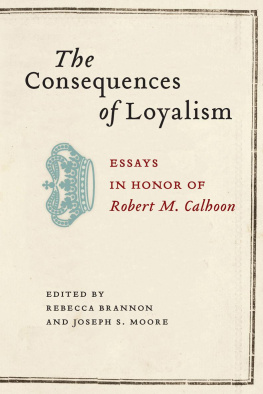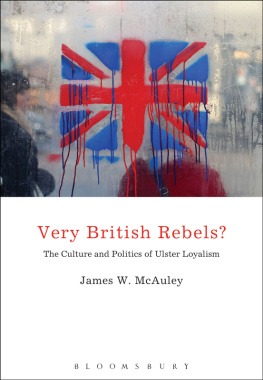Rebecca Brannon - The Consequences of Loyalism: Essays in Honor of Robert M. Calhoon
Here you can read online Rebecca Brannon - The Consequences of Loyalism: Essays in Honor of Robert M. Calhoon full text of the book (entire story) in english for free. Download pdf and epub, get meaning, cover and reviews about this ebook. City: Columbia, year: 2019, publisher: University of South Carolina Press, genre: Politics. Description of the work, (preface) as well as reviews are available. Best literature library LitArk.com created for fans of good reading and offers a wide selection of genres:
Romance novel
Science fiction
Adventure
Detective
Science
History
Home and family
Prose
Art
Politics
Computer
Non-fiction
Religion
Business
Children
Humor
Choose a favorite category and find really read worthwhile books. Enjoy immersion in the world of imagination, feel the emotions of the characters or learn something new for yourself, make an fascinating discovery.
- Book:The Consequences of Loyalism: Essays in Honor of Robert M. Calhoon
- Author:
- Publisher:University of South Carolina Press
- Genre:
- Year:2019
- City:Columbia
- Rating:3 / 5
- Favourites:Add to favourites
- Your mark:
The Consequences of Loyalism: Essays in Honor of Robert M. Calhoon: summary, description and annotation
We offer to read an annotation, description, summary or preface (depends on what the author of the book "The Consequences of Loyalism: Essays in Honor of Robert M. Calhoon" wrote himself). If you haven't found the necessary information about the book — write in the comments, we will try to find it.
Since the 1970s scholars have regarded Robert M. Calhoon as an invigorating and definitive force when it comes to the study of American Loyalism. His decades-long work redefined the Loyalists role in the American Revolution from being portrayed as static characters opposing change to being seen eventually as reactionary actors adapting to a society in upheaval. Loyalists were central to the Revolution, and Calhoon and these authors argue that they were not so different in ideology from their Patriot neighborsexcept occasionally when they were.
The Consequences of Loyalism, Rebecca Brannon and Joseph S. Moore seek to provide an understanding of Calhoons foundational influence and the development continuing in the wake of his prolific career. This volume unites sixteen previously unpublished essays that build on Calhoons work and consider Loyalisms relationship to conflict resolution, imperial bureaucracy, and identity creation. In the first of two sections, established and rising scholars discuss the complexities of Loyalist identity, while considering Calhoons earlier work. In the second section, scholars work from Calhoons later publications to investigate Loyalism in terms of the consequences of Loyalism for the Loyalists, and for the legacy of the Revolutionary War.
The Consequences of Loyalism offers a bold, new reinterpretation of Loyalism. This book brings Loyalist dilemmas alive, digging into their personalities and postwar routes. The essays discuss not only Loyalists experiences during the Revolution, but also their coping and even reintegration in the aftermath. Loyalists from all facets of society fought for what they considered their home country: women wrote letters, commanders took to the battlefield, and thinkers shaped the political conversation. This volume complements Calhoons influential work, expands the scope of Loyalist studies, and opens the field to a deeper, perhaps revolutionary understanding of the kings men.
Rebecca Brannon: author's other books
Who wrote The Consequences of Loyalism: Essays in Honor of Robert M. Calhoon? Find out the surname, the name of the author of the book and a list of all author's works by series.











